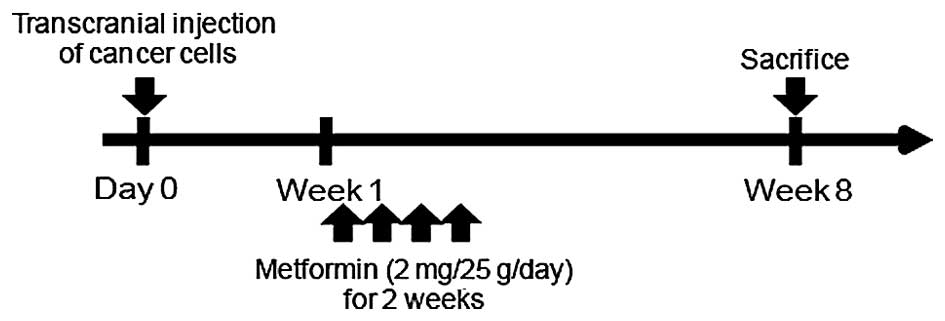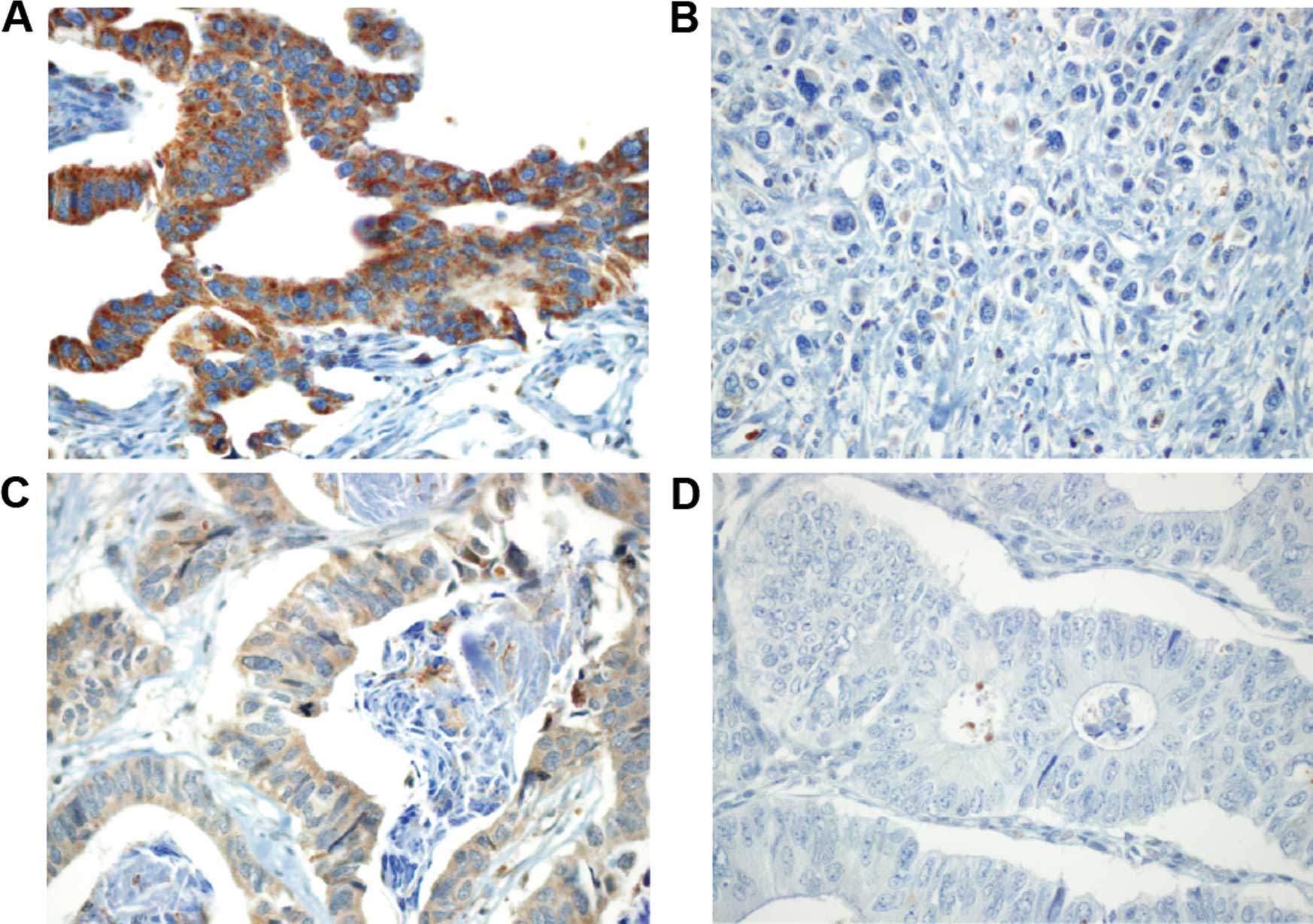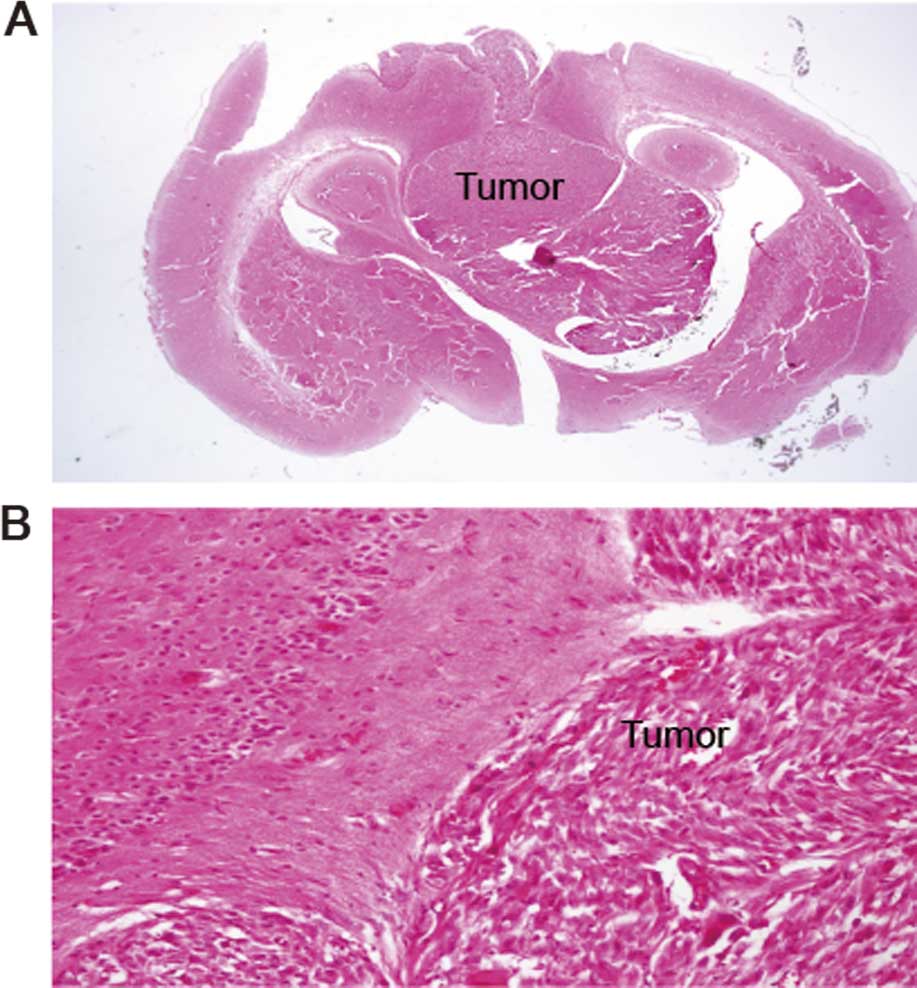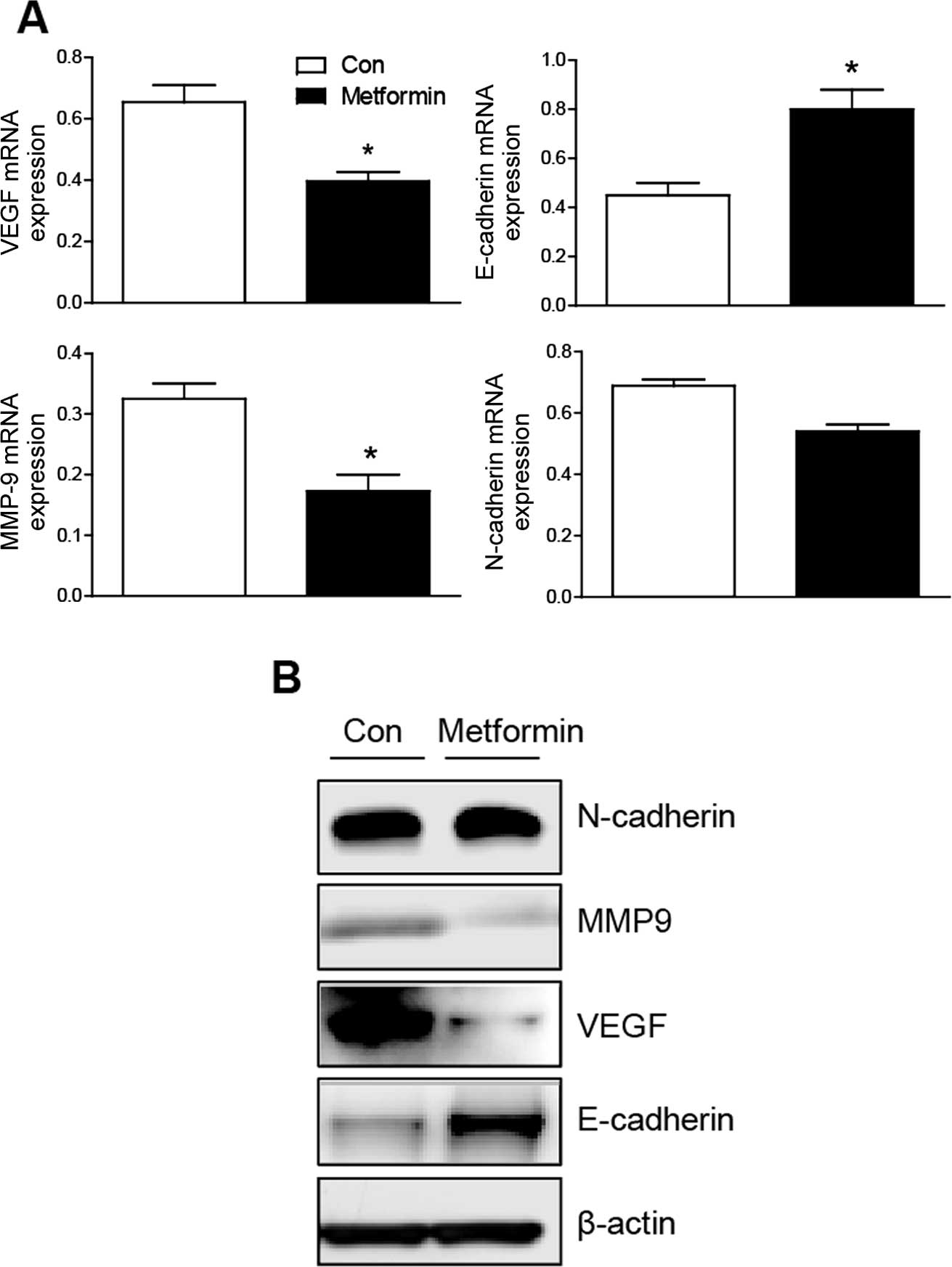|
1
|
Mathers CD, Shibuya K, Boschi-Pinto C,
Lopez AD and Murray CJ: Global and regional estimates of cancer
mortality and incidence by site: I. Application of regional cancer
survival model to estimate cancer mortality distribution by site.
BMC Cancer. 2:36–63. 2002. View Article : Google Scholar : PubMed/NCBI
|
|
2
|
Park CH, Song KY and Kim SN: Treatment
results for gastric cancer surgery: 12 years' experience at a
single institute in Korea. Eur J Surg Oncol. 34:36–41. 2008.
View Article : Google Scholar
|
|
3
|
Kim M: Intracranial involvement by
metastatic advanced gastric carcinoma. J Neurooncol. 43:59–62.
1999. View Article : Google Scholar : PubMed/NCBI
|
|
4
|
Gupta GP, Nguyen DX, Chiang AC, Bos PD,
Kim JY, Nadal C, Gomis RR, Manova-Todorova K and Massagué J:
Mediators of vascular remodelling co-opted for sequential steps in
lung metastasis. Nature. 446:765–770. 2007. View Article : Google Scholar : PubMed/NCBI
|
|
5
|
Shiozaki H, Oka H, Inoue M, Tamura S and
Monden M: E-cadherin mediated adhesion system in cancer cells.
Cancer. 77(Suppl 8): S1605–S1613. 1996. View Article : Google Scholar
|
|
6
|
Ishimine H, Yamakawa N, Sasao M, Tadokoro
M, Kami D, Komazaki S, Tokuhara M, Takada H, Ito Y, Kuno S, et al:
N-Cadherin is a prospective cell surface marker of human
mesenchymal stem cells that have high ability for cardiomyocyte
differentiation. Biochem Biophys Res Commun. 438:753–759. 2013.
View Article : Google Scholar : PubMed/NCBI
|
|
7
|
Decoster E, Vassal A and Faye G: MSS1, a
nuclear-encoded mitochondrial GTPase involved in the expression of
COX1 subunit of cytochrome c oxidase. J Mol Biol. 232:79–88. 1993.
View Article : Google Scholar : PubMed/NCBI
|
|
8
|
Satake S, Semba S, Matsuda Y, Usami Y,
Chiba H, Sawada N, Kasuga M and Yokozaki H: Cdx2 transcription
factor regulates claudin-3 and claudin-4 expression during
intestinal differentiation of gastric carcinoma. Pathol Int.
58:156–163. 2008. View Article : Google Scholar : PubMed/NCBI
|
|
9
|
Kawamura T, Kusakabe T, Sugino T, Watanabe
K, Fukuda T, Nashimoto A, Honma K and Suzuki T: Expression of
glucose transporter-1 in human gastric carcinoma: Association with
tumor aggressiveness, metastasis, and patient survival. Cancer.
92:634–641. 2001. View Article : Google Scholar : PubMed/NCBI
|
|
10
|
Maher F, Davies-Hill TM, Lysko PG,
Henneberry RC and Simpson IA: Expression of two glucose
transporters, GLUT1 and GLUT3, in cultured cerebellar neurons:
Evidence for neuron-specific expression of GLUT3. Mol Cell
Neurosci. 2:351–360. 1991. View Article : Google Scholar : PubMed/NCBI
|
|
11
|
Tang M, Li J, Liu B, Song N, Wang Z and
Yin C: Clusterin expression and human testicular seminoma. Med
Hypotheses. 81:635–637. 2013. View Article : Google Scholar : PubMed/NCBI
|
|
12
|
Trougakos IP and Gonos ES:
Clusterin/apolipoprotein J in human aging and cancer. Int J Biochem
Cell Biol. 34:1430–1448. 2002. View Article : Google Scholar : PubMed/NCBI
|
|
13
|
Gerson KD, Maddula VS, Seligmann BE,
Shearstone JR, Khan A and Mercurio AM: Effects of β4 integrin
expression on microRNA patterns in breast cancer. Biol Open.
1:658–666. 2012. View Article : Google Scholar : PubMed/NCBI
|
|
14
|
Wu J, Liu X and Wang Y: Predictive value
of preoperative serum CCL2, CCL18, and VEGF for the patients with
gastric cancer. BMC Clin Pathol. 13:15–20. 2013. View Article : Google Scholar : PubMed/NCBI
|
|
15
|
Chen C, Yang JM, Hu TT, Xu TJ, Yan G, Hu
SL, Wei W and Xu WP: Prognostic role of human epidermal growth
factor receptor in gastric cancer: A systematic review and
meta-analysis. Arch Med Res. 44:380–389. 2013. View Article : Google Scholar : PubMed/NCBI
|
|
16
|
Preusser M, Berghoff AS, Ilhan-Mutlu A,
Dinhof C, Magerle M, Marosi C, Hejna M, Capper D, Von Deimling A,
Schoppmann SF, et al: Brain metastases of gastro-oesophageal
cancer: Evaluation of molecules with relevance for targeted
therapies. Anticancer Res. 33:1065–1071. 2013.PubMed/NCBI
|
|
17
|
Yamada Y, Yoshida T, Hayashi K, Sekiya T,
Yokota J, Hirohashi S, Nakatani K, Nakano H, Sugimura T and Terada
M: p53 gene mutations in gastric cancer metastases and in gastric
cancer cell lines derived from metastases. Cancer Res.
51:5800–5805. 1991.PubMed/NCBI
|
|
18
|
de Vries AC and Kuipers EJ: Commentary:
Metformin use is associated with reduced gastric cancer risk.
Aliment Pharmacol Ther. 39:12392014. View Article : Google Scholar : PubMed/NCBI
|
|
19
|
Ruiter R, Visser LE, van Herk-Sukel MP,
Coebergh JW, Haak HR, Geelhoed-Duijvestijn PH, Straus SM, Herings
RM and Stricker BH: Lower risk of cancer in patients on metformin
in comparison with those on sulfonylurea derivatives: Results from
a large population-based follow-up study. Diabetes Care.
35:119–124. 2012. View Article : Google Scholar :
|
|
20
|
Kato K, Gong J, Iwama H, Kitanaka A, Tani
J, Miyoshi H, Nomura K, Mimura S, Kobayashi M, Aritomo Y, et al:
The anti-diabetic drug metformin inhibits gastric cancer cell
proliferation in vitro and in vivo. Mol Cancer Ther. 11:549–560.
2012. View Article : Google Scholar : PubMed/NCBI
|
|
21
|
Japanese Gastric Cancer Association:
Japanese classification of gastric carcinoma: 3rd English edition.
Gastric Cancer. 14:101–112. 2011. View Article : Google Scholar : PubMed/NCBI
|
|
22
|
Kim LS, Huang S, Lu W, Lev DC and Price
JE: Vascular endothelial growth factor expression promotes the
growth of breast cancer brain metastases in nude mice. Clin Exp
Metastasis. 21:107–118. 2004. View Article : Google Scholar : PubMed/NCBI
|
|
23
|
JuanYin J, Tracy K, Zhang L, Munasinghe J,
Shapiro E, Koretsky A and Kelly K: Noninvasive imaging of the
functional effects of anti-VEGF therapy on tumor cell extravasation
and regional blood volume in an experimental brain metastasis
model. Clin Exp Metastasis. 26:403–414. 2009. View Article : Google Scholar : PubMed/NCBI
|
|
24
|
Herrlinger U, Wiendl H, Renninger M,
Förschler H, Dichgans J and Weller M: Vascular endothelial growth
factor (VEGF) in leptomeningeal metastasis: Diagnostic and
prognostic value. Br J Cancer. 91:219–224. 2004.PubMed/NCBI
|
|
25
|
Gril B, Evans L, Palmieri D and Steeg PS:
Translational research in brain metastasis is identifying molecular
pathways that may lead to the development of new therapeutic
strategies. Eur J Cancer. 46:1204–1210. 2010. View Article : Google Scholar : PubMed/NCBI
|
|
26
|
Kamikihara T, Ishigami S, Arigami T,
Matsumoto M, Okumura H, Uchikado Y, Kita Y, Kurahara H, Kijima Y,
Ueno S, et al: Clinical implications of N-cadherin expression in
gastric cancer. Pathol Int. 62:161–166. 2012. View Article : Google Scholar : PubMed/NCBI
|
|
27
|
Lee JL, Kang YK, Kim TW, Chang HM, Lee GW,
Ryu MH, Kim E, Oh SJ, Lee JH, Kim SB, et al: Leptomeningeal
carcinomatosis in gastric cancer. J Neurooncol. 66:167–174. 2004.
View Article : Google Scholar : PubMed/NCBI
|
|
28
|
Tomita H, Yasui H, Boku N, Nakasu Y,
Mitsuya K, Onozawa Y, Fukutomi A, Yamazaki K, Machida N, Taku K, et
al: Leptomeningeal carcinomatosis associated with gastric cancer.
Int J Clin Oncol. 17:361–366. 2012. View Article : Google Scholar
|
|
29
|
York JE, Stringer J, Ajani JA, Wildrick DM
and Gokaslan ZL: Gastric cancer and metastasis to the brain. Ann
Surg Oncol. 6:771–776. 1999. View Article : Google Scholar
|
|
30
|
Kasakura Y, Fujii M, Mochizuki F, Suzuki T
and Takahashi T: Clinicopathological study of brain metastasis in
gastric cancer patients. Surg Today. 30:485–490. 2000. View Article : Google Scholar : PubMed/NCBI
|
|
31
|
Prudkin L, Liu DD, Ozburn NC, Sun M,
Behrens C, Tang X, Brown KC, Bekele BN, Moran C and Wistuba II:
Epithelial-to-mesenchymal transition in the development and
progression of adenocarcinoma and squamous cell carcinoma of the
lung. Mod Pathol. 22:668–678. 2009. View Article : Google Scholar : PubMed/NCBI
|
|
32
|
Yoo JY, Yang SH, Lee JE, Cho DG, Kim HK,
Kim SH, Kim IS, Hong JT, Sung JH, Son BC, et al: E-cadherin as a
predictive marker of brain metastasis in non-small-cell lung
cancer, and its regulation by pioglitazone in a preclinical model.
J Neurooncol. 109:219–227. 2012. View Article : Google Scholar : PubMed/NCBI
|
|
33
|
Ishibashi Y, Matsui T, Takeuchi M and
Yamagishi S: Metformin inhibits advanced glycation end products
(AGEs)-induced growth and VEGF expression in MCF-7 breast cancer
cells by suppressing AGEs receptor expression via AMP-activated
protein kinase. Horm Metab Res. 45:387–390. 2013.
|
|
34
|
Cufí S, Vazquez-Martin A,
Oliveras-Ferraros C, Martin-Castillo B, Joven J and Menendez JA:
Metformin against TGFβ-induced epithelial-to-mesenchymal transition
(EMT): From cancer stem cells to aging-associated fibrosis. Cell
Cycle. 9:4461–4468. 2010. View Article : Google Scholar
|
|
35
|
Rattan R, Graham RP, Maguire JL, Giri S
and Shridhar V: Metformin suppresses ovarian cancer growth and
metastasis with enhancement of cisplatin cytotoxicity in vivo.
Neoplasia. 13:483–491. 2011. View Article : Google Scholar : PubMed/NCBI
|
|
36
|
Cerezo M, Tichet M, Abbe P, Ohanna M,
Lehraiki A, Rouaud F, Allegra M, Giacchero D, Bahadoran P,
Bertolotto C, et al: Metformin blocks melanoma invasion and
metastasis development in AMPK/p53-dependent manner. Mol Cancer
Ther. 12:1605–1615. 2013. View Article : Google Scholar : PubMed/NCBI
|


















